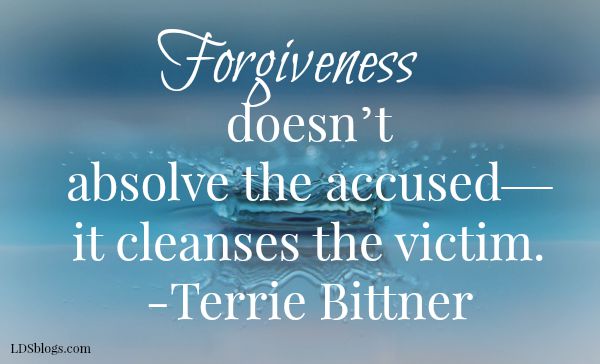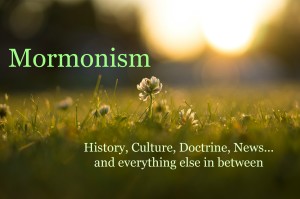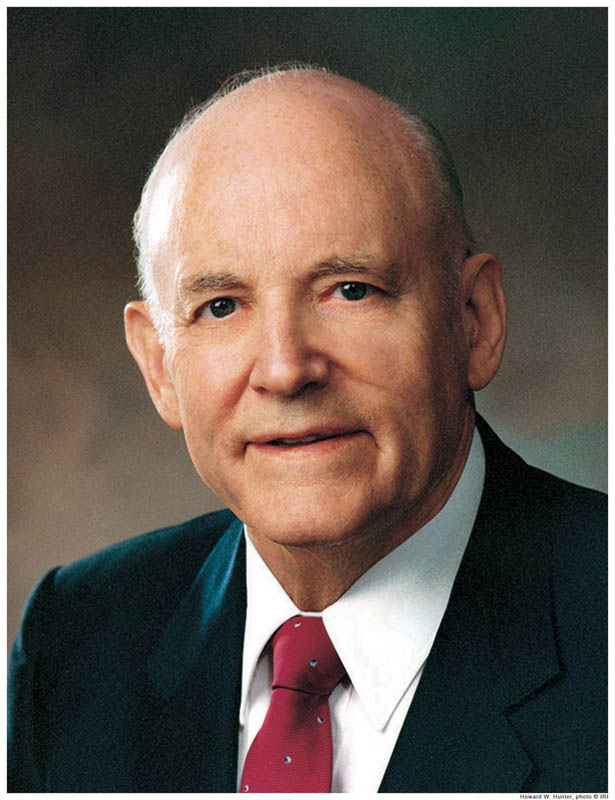A snarky 20 year old guy who was a devoted member of my church once lived in the apartment we used to rent out in our basement. He had a quirky habit of playing practical jokes, and I had no sense of humor. His timing was perfect; he always got me at the most inopportune moments. And did I mention he was immature? I grew to loathe his “talent.”
One time he got me really good, riled my dander, and ruined my day, and I remember yelling down to him, “I will never forgive you for this!” To which he shot up a reply, “Oh yes you will—you have to if you want to make it to heaven!” I fumed for the rest of the day. Not because he got me again, and got me good, but because there was a drop of truth to his response. Forgiveness doesn’t absolve the accused—it cleanses the victim. We need to be clean if we want to be in the presence of our Lord. We need to forgive. I had a lot of work to do.
 Last week I took out my latter-day microscope and analyzed the musical “Scrooge” based on Charles Dickens’ A Christmas Carol. I asked the question, “Can people really change?” The answer was a resounding yes, if they let the Savior walk them through the changes. We’ve all had scrooges who’ve hurt us. Whether they’re the simple practical jokers who annoy us, or someone more destructive—an estranged spouse, a cruel boss, an abusive or neglectful relative—the question of forgiveness lies in our lap just as heavily as the crimes of their actions weigh them down. How can we be truly clean if we neglect to forgive? And how can we forgive when it hurts so much? Let’s take a breath and walk through the forgiveness process together.
Last week I took out my latter-day microscope and analyzed the musical “Scrooge” based on Charles Dickens’ A Christmas Carol. I asked the question, “Can people really change?” The answer was a resounding yes, if they let the Savior walk them through the changes. We’ve all had scrooges who’ve hurt us. Whether they’re the simple practical jokers who annoy us, or someone more destructive—an estranged spouse, a cruel boss, an abusive or neglectful relative—the question of forgiveness lies in our lap just as heavily as the crimes of their actions weigh them down. How can we be truly clean if we neglect to forgive? And how can we forgive when it hurts so much? Let’s take a breath and walk through the forgiveness process together.
Forgiveness is often a misunderstood action, probably because when we are in need of forgiving someone, we are still riling in hurt feelings over their actions against us. We can’t possibly begin to forgive when our minds are burdened with the cloudy, unsettled feelings of anger and pain. Take a step back and remember what forgiveness is—and what it isn’t.
Forgiving someone does not mean you have to welcome a dangerous, unrepentant person into your personal space. Some people feel like if they can’t do that, they haven’t really forgiven. But it’s not true. Forgiving others does not mean approving of their wrongdoing or offense. Forgiving someone means that with the help of our Father in Heaven, we can cleanse our hearts of anger or hatred toward the offender, cease to dwell on the offense, and feel peace. Sometimes we also must seek the  association of other people. But with prayer, the Lord will make this possible. This process is not always easy or quick, but Heavenly Father will help us as we try to forgive. (Preparing for Exaltation: Teacher’s Manual, (1998), 197–202)
association of other people. But with prayer, the Lord will make this possible. This process is not always easy or quick, but Heavenly Father will help us as we try to forgive. (Preparing for Exaltation: Teacher’s Manual, (1998), 197–202)
When someone has truly hurt me, I often times come back to this definition. It is so helpful to remember that forgiveness does not absolve the person from their accountability. That is something they must face with the Lord and in the Lord’s time. Forgiveness is for me. It is dangerous for me to dwell on the aggressor during my own forgiving process.
I use the word dangerous because the poisons of anger and hurt destroy my soul, and my soul is the one that needs healing first and foremost. I need to separate the oppressor’s crimes from my own crime of holding onto anger, then let the Lord walk with me as he so willingly offers to do. That is the first step. Christ told us himself he would walk with us when he said “Come unto me, all ye that labor and are heavy laden and I will give you rest. Take my yoke upon you, learn of me; for I am meek and lowly in heart and ye shall find rest unto your souls. My yoke is easy and my burden is light.” (Matthew 11:28-30).
“When we burden ourselves with anger, hate, and vengeance, we forfeit the blessings of having the guidance of the Holy Spirit. We invite the spirit of the adversary into our lives and thus limit our own progress toward exaltation when we are unforgiving. We invite the Holy Spirit into our lives when we follow the example of Jesus Christ and truly forgive.” (Preparing for Exaltation: Teacher’s Manual, (1998), 197–202)
 As a Latter-day Saint, I recognize that the Holy Spirit is the still small feeling of peace and clarity of mind and heart that comes over me when I hear something that is right and when I do and say things that are good. Some call it your conscience, but we recognize the divine source of this feeling. Anyone can train himself to feel it, but it takes time and effort. As the quote above states, this can be done through following the examples of Jesus Christ. Elder Richard G. Scott of the Quorum of the Twelve Apostles said,
As a Latter-day Saint, I recognize that the Holy Spirit is the still small feeling of peace and clarity of mind and heart that comes over me when I hear something that is right and when I do and say things that are good. Some call it your conscience, but we recognize the divine source of this feeling. Anyone can train himself to feel it, but it takes time and effort. As the quote above states, this can be done through following the examples of Jesus Christ. Elder Richard G. Scott of the Quorum of the Twelve Apostles said,
“Forgiveness … allows the love of God to purge your heart and mind of the poison of hate. It cleanses your consciousness of the desire for revenge. It makes place for the purifying, healing, restoring love of the Lord.
The Master counseled, “Love your enemies, bless them that curse you, do good to them that hate you, and pray for them who despitefully use you and persecute you” (3 Nephi 12:44).
Bitterness and hatred are harmful. They produce much that is destructive. They postpone the relief and healing you yearn for. Through rationalization and self-pity, they can transform a victim into an abuser. Let God be the judge—you cannot do it as well as He can.”
We all will face a time when we have to forgive someone. The offenses may be small or large, but as Elder Scott said, the Lord is infinitely more qualified to handle it than we are. Trust Him, step back, and let Him heal you as you let that pain go. He will heal you, and you will find that leaning on Him for support makes you stronger than you ever thought possible.
About Terrie Lynn Bittner
The late Terrie Lynn Bittner—beloved wife, mother, grandmother, and friend—was the author of two homeschooling books and numerous articles, including several that appeared in Latter-day Saint magazines. She became a member of the Church at the age of 17 and began sharing her faith online in 1992.







